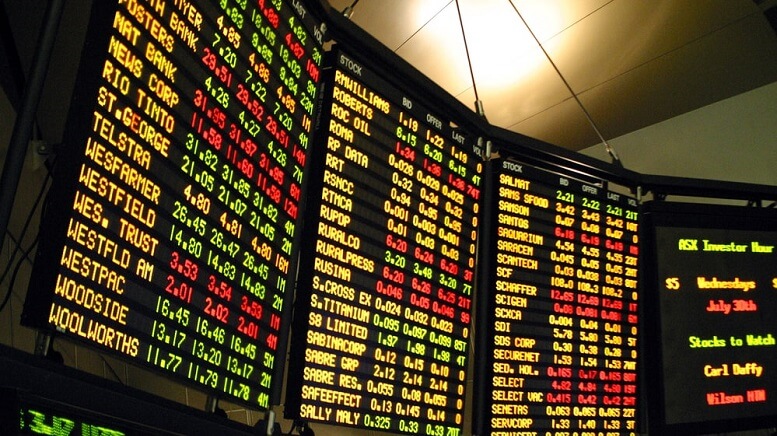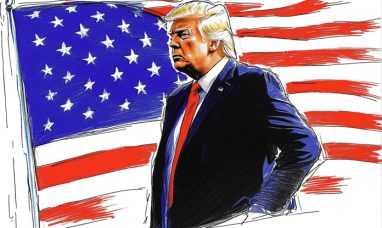Wall Street showed muted movement on Thursday as investors absorbed the economic fallout from newly announced U.S. sanctions on Russia. President Donald Trump’s “massive” sanctions package targeting the Russian energy sector sent oil prices sharply higher, reshaping global markets and pressuring several major stocks.
Market Reaction to Sanctions
The S&P 500 Index edged up just 0.1% in early trading, staying near record highs set earlier this month. The Dow Jones Industrial Average remained largely unchanged, while the Nasdaq Composite hovered flat as investors balanced optimism about U.S. corporate earnings with concerns about geopolitical tensions.
Crude oil prices, however, surged in response to the sanctions. U.S. benchmark crude gained $3.13 to $61.63 per barrel, while international benchmark Brent crude rose $3.13 to $65.72. The jump of more than 5% reflected investor fears that sanctions against major Russian oil producers Rosneft and Lukoil could tighten global energy supplies.
Impact of U.S. Sanctions on Russia
The U.S. sanctions on Russia are intended to pressure President Vladimir Putin to negotiate toward ending the ongoing war in Ukraine. By targeting key players in Russia’s energy sector, Washington aims to curb Moscow’s oil revenue — a critical source of funding for its military operations.
European Union leaders simultaneously met in Brussels to discuss additional measures, including using frozen Russian assets to support Ukraine’s economy and reconstruction efforts over the next two years. These moves signaled a coordinated transatlantic effort to intensify economic pressure on Russia while ensuring continued support for Ukraine.
Corporate Highlights: Tesla, IBM, and Molina Healthcare
Several major corporations also made headlines. Tesla Inc. (NASDAQ:TSLA) dropped 3.2% after reporting a 37% year-over-year decline in quarterly profit — its fourth consecutive quarterly drop. Despite this, revenue exceeded forecasts. CEO Elon Musk emphasized Tesla’s long-term growth strategy beyond vehicle sales, highlighting its autonomous robotaxi initiative, AI technologies, and Optimus humanoid robots.
Meanwhile, International Business Machines Corporation (NYSE:IBM) fell 6.8% despite beating profit and revenue expectations. The company’s results showed a slowdown in its cloud division’s growth, though executives reaffirmed that cloud computing and artificial intelligence remain IBM’s primary focus areas.
Molina Healthcare Inc. (NYSE:MOH) saw its stock tumble over 20% after missing earnings expectations and lowering its full-year forecast, citing higher costs across all business segments.
Global Markets React to Energy and Policy Shifts
European markets were mixed as investors weighed energy price volatility and potential economic headwinds. Germany’s DAX slipped 0.3%, while the U.K.’s FTSE 100 added 0.6%, buoyed by oil and commodity stocks. France’s CAC 40 rose 0.4%.
In Asia, market movements were uneven. Hong Kong’s Hang Seng gained 0.7% and Shanghai’s Composite Index edged up 0.2% amid reports that Washington may tighten restrictions on exports to China involving U.S. technology. Japan’s Nikkei 225 dropped 1.4%, led by SoftBank Group Corp. (TYO:9984), which fell over 4% after announcing plans to issue U.S. dollar and euro bonds to finance its growing artificial intelligence investments.
Japanese Prime Minister Sanae Takaichi also hinted at maintaining ultra-low interest rates and introducing a new fiscal stimulus package worth nearly ¥14 trillion (about $92 billion), further weakening the yen, which traded at 152.75 per U.S. dollar.
Energy Prices and Safe Haven Assets
The surge in oil prices following U.S. sanctions on Russia rippled through global markets, boosting energy stocks but renewing inflation concerns. Higher fuel costs could pressure consumer spending and corporate margins if the rally persists.
Meanwhile, gold prices recovered 1.6% to $4,131.80 per ounce after two days of losses, reflecting renewed investor demand for safe-haven assets amid geopolitical uncertainty.
Outlook
While Wall Street’s major indexes remain near record levels, the market’s calm exterior masks significant geopolitical and economic crosscurrents. The U.S. sanctions on Russia are reshaping the global energy landscape and adding fresh uncertainty to an already fragile equilibrium.
Investors will be watching closely to see how these sanctions affect oil supply chains, inflation trends, and corporate earnings — especially in energy-intensive sectors — as the year progresses.
Featured Image – Depositphotos









